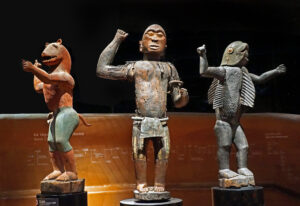The Antiquities Coalition is honored to participate in the 2025 Annual Meeting of the International Scientific Committee on Archaeological Heritage Management (ICAHM), now underway in Chile.
Launched at the Palacio Pereira—headquarters of the Ministry of Culture, Arts and Heritage—the conference opened with a powerful ceremony reflecting Chile’s deep cultural ties to the land and its long-standing commitment to safeguarding archaeological heritage.
The gathering convenes a diverse group of stakeholders: global experts, national authorities, Indigenous communities, and cultural institutions united by a shared goal—ensuring the protection of archaeological sites for future generations. In her opening remarks, Esther Laroche, UNESCO Regional Director for Latin America and the Caribbean, reflected that “here, the notion of heritage is not abstract: it is territory, identity, and culture.” Edgar Colque of the Council of Atacameño Peoples echoed this sentiment, asserting, “Indigenous worldviews are not frozen in the past. They are present, tied to land, and based on relationships…it is a legitimate and profound way of understanding heritage, its value, and its care.”
These insights reflect the real-world focus of this convening: finding results-driven, locally led solutions to protect cultural heritage—solutions that uphold the rule of law, national sovereignty, and respect for communities. These strategies extend beyond heritage preservation, contributing to economic growth and trade, reinforcing national and regional security, and fostering resilient communities. As a longtime advocate for practical, cross-sector collaboration, the Antiquities Coalition is proud to support this mission and contribute U.S. leadership to the effort.
Later this week, the Antiquities Coalition will host the session “Process of Plundering and Restitution of Archaeological and Anthropological Collections,” led by Executive Director Tess Davis and Director of Programs Helena Arose in their capacity as co-leads of ICAHM’s Illicit Trafficking Working Group. The session will examine how heritage crimes—from looting to money laundering—can be addressed through legal, ethical, and policy reform, with a focus on Latin America.
ICAHM 2025 offers a vital platform to carry that message forward—backed by a regional perspective, shared responsibilities, and a shared determination to protect the past from plunder.
Tune in to live updates from the conference on BlueSky and Twitter.
Revisit insights about the illicit trade in Central America, shared by Mexico’s Ambassador Javier Díaz de León at CoSP10 in 2023, here.
Read the Annual Meeting program, here.









